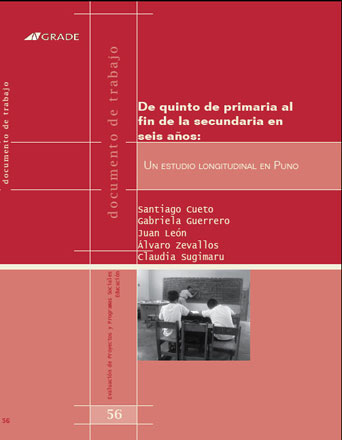De quinto de primaria al fin de la secundaria en seis años: un estudio longitudinal en Puno
| Año | : | 2010 |
|---|---|---|
| Autor/es | : | Santiago Cueto, Gabriela Guerrero, Claudia Sugimaru, Juan León, Álvaro Zevallos |
| Área/s | : | Educación y aprendizajes |
Cueto, S., Guerrero, G., León, J., Zevallos, A. y Sugimaru, C. (2010). De quinto de primaria al fin de la secundaria en seis años: un estudio longitudinal en Puno (Documento de Trabajo N° 56). Lima: GRADE; CIES.
El presente estudio reporta los resultados de un diseño longitudinal en el que se siguió a 304 estudiantes de zonas urbanas y rurales de Puno. Los estudiantes incluidos se encontraban en quinto grado de primaria en el 2000 y debían estar en quinto de secundaria (el fin de la educación básica) en el 2006, cuando se los volvió a encuestar y entrevistar. Se logró volver a entrevistar a 76% de los estudiantes de la muestra original; del resto, la mayoría había migrado fuera de Puno, de acuerdo con reportes de amigos y familiares.De los entrevistados, 69% habían avanzado sin repetir, 13% habían abandonado la escuela y el resto habían repetido uno o más grados.
Por un lado, los resultados sugieren que el rendimiento en una prueba estandarizada de matemática en quinto de primaria tiene un peso estadísticamente significativo para explicar el rendimiento en comprensión de lectura y matemática seis años después, así como la probabilidad de avanzar de grado sin repetir. Por otro lado, la deserción escolar se asoció principalmente a la necesidad del estudiante de trabajar.
En conjunto, el estudio sugiere la necesidad de encontrar mecanismos para apoyar el desempeño educativo de estudiantes de contextos de mayor pobreza y/o menor rendimiento, que si bien no son discriminados por el sistema, tampoco son atendidos en sus necesidades específicas.







